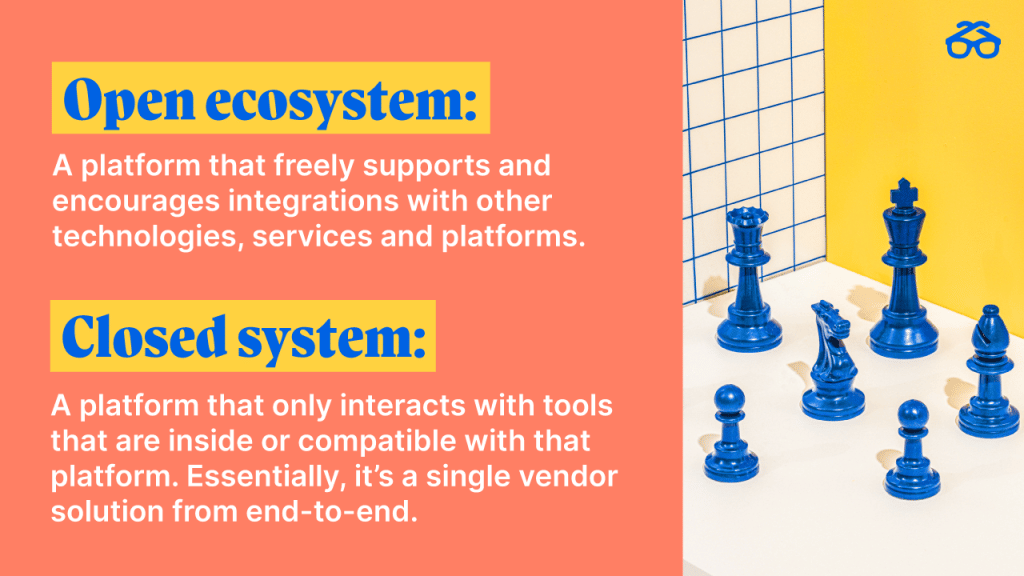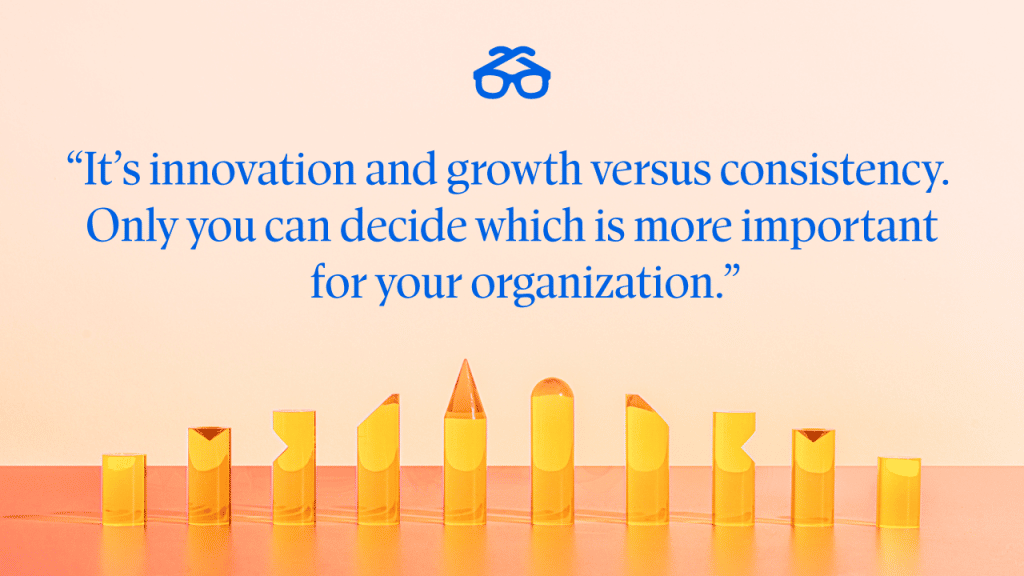Tech people talk a lot about whether an open ecosystem or a closed system is better for business. But why should you, as a learning professional, care as long as you can get the tools you need right now?
How your systems are designed can determine how well the combined elements of your learning tech stack work (or don’t work) together, how prepared your business is for challenges and change and how your organization works day to day.
What’s the Difference?
Open ecosystem: A platform that freely supports and encourages integrations with other technologies, services and platforms.
Closed system: A platform that only interacts with tools that are inside or compatible with that platform. Essentially, it’s a single vendor solution from end-to-end.

Consider a manager with an open-door policy. This kind of manager is always ready for a new conversation and tends to use a mindshare philosophy — collaborating with coworkers to build an ideal workplace and achieve goals. These relationships take time to cultivate and maintain, but it creates more diverse business ideas and opportunities. That’s an open ecosystem.
Now consider a manager who focuses best behind a closed door. This kind of manager is productive, efficient and excels at meeting deadlines. But this person misses opportunities outside — people with new useful skills, creative ideas from peers and more. That’s a closed system.
Which System Is Better?
It’s not so much a question of which is better. Instead, it’s about which type of system will help you reach your goals.
An open ecosystem can grow with your organization and connect tools you already use. As new challenges and opportunities arise, you can get access to new, innovative tools quickly and easily. You’re never locked in to any one vendor because there’s always an opportunity for integration.
“Today’s consumers are looking for the solutions that can help them grow, improve and meet business goals and evolving industry dynamics,” according to Jeff Gallino, Forbes Council Member. “Successful solution providers are willing to integrate and co-mingle their offerings with others to deliver this value.”
On the other hand, a closed system can provide a greater ability to resolve technical issues because everything is under one roof. And while there’s more general consistency in capabilities, tool access and growth can be limited and rigid as your organization changes. Closed system technologies may acquire new tools over time, but you probably won’t get much of a say in which tools are added.
It’s innovation and growth versus consistency. Only you can decide which is more important for your organization.

What Does History Say?
Put simply, history tends to lean toward open ecosystems. Here’s a classic example:
A few decades ago, BetaMax and VHS vied for format dominance in the video cassette market. BetaMax, created by Sony, was the superior technology — the tapes were smaller, the video resolution was higher and the recording capacity was larger. Yet you can probably guess by the familiarity of the VHS name which became the format of choice for most consumers. But why?
Sony managed BetaMax video players and tapes in a closed system model. “Sony likes to control everything with all of its products, meaning you can only buy Sony stuff from Sony to go with other Sony stuff,” according to a historical rundown on the aperture blog.
On the contrary, VHS technology initially developed by JVC was not proprietary. It was easier for other vendors to mimic and cheaper to make. Over time, numerous companies entered the VHS market, which drove prices down further. As the VHS market evolved and grew, movie producers found it more profitable to release movies in VHS format for rentals. By the early 1980s, the VHS format reigned.
The willingness of VHS creators to be open and work seamlessly with other vendors proved to be a differentiator for consumers, even though the actual technology itself was slightly inferior.
Why Is Degreed an Open Ecosystem?
Degreed operates on an open ecosystem model, and we continue to see value in it for our clients every day. We’re open for three critical reasons:
1. We’re passionate about lifelong learning.
Degreed was founded on the principle of learning happens anywhere, anytime, and our mission is to create lifelong learners. Learning and skill development come from multiple sources, inputs and data types.
Capturing and tracking information about learning wherever it happens, by definition, requires an open ecosystem. Our integrations with other vendors (including competitors) make relevant content and data insights more available and accessing them more convenient. In many cases, it’s as easy as a single click. We embrace and work hard on these integrations to make it easy for you.
2. L&D needs to be flexible and agile.
Consider the massive changes the learning industry has undergone in recent years. Unexpected changes and challenges will always happen, so it’s good business planning to design flexibility into your learning strategy. With an open learning ecosystem, whenever it makes sense, Degreed can quickly connect your people to a wide range of content providers and development opportunities while improving the day-to-day experiences of your workers as well as your L&D team.
The future of L&D means delivering learning remotely, personalized and more efficiently. And the Degreed open ecosystem allows us to help you easily pivot and embrace change instead of fearing it, so you can help your people take on whatever tomorrow holds. Give them a foundation that is flexible with their growth, not static against it.
3. Our clients deserve the best in the business.
At Degreed, we aren’t intimidated by healthy competition. In fact, it makes us better. We know our strengths and recognize other companies have different and useful specialites.
Our clients expect a best-of-breed approach to their end-to-end solutions. Each organization has different needs, and no one vendor has it all. That’s why we integrate with other vendors — so our clients can have it all. It’s a key part of how we achieve a people-centric, amazing client experience.
Integrations and Partnerships
The Degreed ecosystem currently has 14 LMS provider integrations and more than 60 content partners.
One of our recent partnerships is with Filtered, a content curation tool. This integration improves our clients’ user experience with additional time-saving content curation and analytics for their learning content. This partnership furthers our dedication to our clients’ operational efficiency, employee engagement and overall learning experience.
In a lot of ways, it would be easier to close the metaphorical door, keep our head down, focus only on what we do and ignore everything else going on around us. But it wouldn’t help us make the change we wish to see in the world. For you or for us.
Want to Learn More?
If you want to get a sneak peek of the possibilities that come with an open ecosystem LXP, schedule a personalized Degreed demo today.
Download Building Your Learning Tech Ecosystem. You’ll explore how to create an effective and interconnected learning tech stack.

